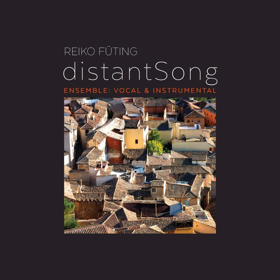Composer Reiko Füting Releases International Portrait Album DistantSong On New Focus Recordings

On Friday, December 14, 2018 digitally and January 4, 2018 physically, New Focus Recordings releases distantSong, the second album of the compositions of composer Reiko Füting. The album features works for voices and instruments performed by established young ensembles in both the United States and Europe, including AuditivVokal Dresden, Art d'Echo, loadbang, the Corrine Byrne:Kozar:Duo, Damask, and Oerknal. The compositions included are emblematic of Futing's deeply humanistic approach to creative activity and a sensitivity to contemporary political issues.
Füting says, "With my music, I aim to explore the psychological nature of memory, as it is projected onto the compositional device of musical quotation. By realizing this device in the entire musical spectrum of assimilation, integration, disintegration, and segregation, while moving freely between clear borders and gradual transitions, quotation and memory may function as a means to reflect upon contemporary artistic, cultural, social, and political phenomena."
The opening two works on distantSong are based on pieces written during the 30 years war by Baroque composer Heinrich Schutz in which he called for peace. Füting dedicates the album to musicologist Wolfram Steude (1931- 2006), who suggested Füting write a composition in response to the music of Heinrich Schutz when he was a student at the Hochschule fur Musik Dresden. "als ein licht"/extensio ("as a light"/extensio), after a poem by Kathleen Furthmann, for vocal ensemble, viola da gamba quintet, percussion quartet, and positiv organ (2011/rev. 2018), was commissioned by the Meißner Kantorei for the thirty-third Lutheran Convention in Dresden in 2011. Heinrich Schutz's motet "Verleih uns Frieden gnadiglich," from Geistliche Chormusik 1648, written at the end of the Thirty Years' War, served as the compositional origin. The spoken words toward the end are by Francis of Assisi, Hannah Arendt, and Martin Luther King.
"in allem frieden" ("in all peace"), after a poem by Kathleen Furthmann, is based on Heinrich Schutz's Da pacem, Domine, a work written for the Elector Convention in Muhlhausen in 1627, an ill-fated effort to thwart the Thirty Years' War. wie der Tag - wie das Licht (as the day - as the light), also after a poem by Kathleen Furthmann, functions as an epilogue to "in allem frieden." The lyrics are based on Psalm 139: "...even the darkness will not be dark to you; the night will shine like the day, for darkness is as light to you."
eternal return (Passacaglia) for soprano and trumpet (2017) was commissioned by Corrine Byrne and Andrew Kozar. The text was taken from Friedrich Nietzsche's Thus Spoke Zarathustra: "And eternal recurrence also of the smallest!" mo(nu)ment for C (Mo(nu)ment fur C), for baritone, trumpet, trombone, and bass clarinet (2017), was commissioned by loadbang. The title refers to sculptures by the American artist Dan Flavin. The text consists of three fragments - "Je suis" (French), "Ich bin" (German), and "I am" (English), referring to the attack on Charlie Hebdo on January 7, 2015.
Weg, Lied der Schwane (Journey, Song of the Swans), for ensemble (2015), was commissioned by Oerknal. The composition was written mainly during a residency at the Civitella Ranieri castle in Umbria, Italy. The original material is based on a madrigal by Jakob Arcadelt, "Il bianco e dolce cigno", which appears shadow-like at the composition's conclusion. The spoken words toward the end of the main section are taken from the title of the 2014 German film Hin und Weg, directed by Christian Zubert, which deals with the complex issue of euthanasia.
versinkend, versingend, verklingend: fernes Lied (sinking, singing, sounding: distant song), for vocal quartet and instrumental ensemble (2015), was co-commissioned by Oerknal and Damask. It is based on Claude Debussy's piano prelude "La cathedrale engloutie;" the epilogue refers to the 15th Century German folk song Gesegn dich Laub.
About Reiko Füting
Born 1970 in Königs Wusterhausen of the German Democratic Republic, Reiko Füting was educated at the Wernigerode State High School for Music, the Hochschule für Musik in Dresden "Carl Maria von Weber", the Shepherd School at Rice University in Houston, Manhattan School of Music in New York City, and Seoul National University. Some of his most influential teachers have been the composers Jörg Herchet and Nils Vigeland, and the pianist Winfried Apel. During his studies, he attended master classes with Edisson Denissov, Tristan Murail, and Christian Wolff (composition), and with Elisabeth Schwarzkopf, Olaf Bär, and Semion Skigin (vocal accompanying).
Reiko Füting joined the theory faculty at the Manhattan School of Music in 2000; five years later, he became a member of the composition faculty and was appointed chair of the theory department. He has also taught vocal accompanying at the Conservatory of Music and Theater in Rostock, Germany, and appeared as guest faculty and lecturer at universities and conservatories in China (Changchun, Beijing, Shenyang), Colombia (Bogotá, Medellîn), Germany (Berlin, Dresden, Rostock, Leipzig), Italy (Rome), Russia (Moscow), and the United States (Baltimore, Boston, Hempstead, New York, Oberlin, Philadelphia, Princeton).
As a composer, Reiko Füting has received numerous prizes, awards, scholarships, grants, and commissions. His music has been performed at prestigious venues (Berlin Cathedral, Semper Opera House Dresden, Zankel Hall at Carnegie Hall New York) by renowned instrumentalists (Miranda Cuckson, Aki Takahashi, Dan Lippel), vocalists (Gertrud Günther, Monica Meier-Schmid, Matthias Vieweg), conductors (Roland Kluttig, Jeff Milarsky, Hans-Christoph Rademann), chamber groups (elole Piano Trio, loadbang, Mivos String Quartet), ensembles (Ensemble courage, International Contemporary Ensemble ICE, Oerknal), orchestras (Dresdner Barockorchester, Sinfonietta Dresden, Janácek Philharmonic Orchestra), vocal ensembles (AuditivVokal Dresden, Calmus, Singer Pur), choirs (Dresdner Chamber Choir, RIAS Chamber Choir, Berlin Radio Choir) in Austria, Belgium, Bulgaria, China, Colombia, Croatia, the Czech Republic, Denmark, England, France, Germany, Greece, Iceland, Iran, Italy, Japan, Latvia, Luxemburg, Norway, Romania, Russia, South Korea, Spain, the United States, Uzbekistan, and Vietnam., broadcast on radio and television, and released on CDs (New Focus Recordings, Oehms Classics, Deutsche Schallplatten). His publications (Schott, Carus, Routledge) include compositions, arrangements, and analytical articles. More information at www.reikofueting.com.
Comments
Videos

